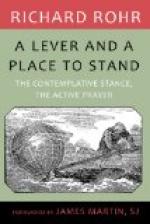“The public may not be so generous,” suggested Covington.
“You forget that I have great faith in that same public,” Gorham answered, strangely calm in the face of such great provocation.
“You know it, Robert?” Eleanor asked, scarcely believing what she heard. “How can you know it? You mean that your faith in me is strong enough to make you believe it.”
“You may tell them that story, Covington,” Gorham said, rising; “but it will make it even more interesting if you add the finale which you are going to witness now.”
Then he turned to his wife and took her hand in his.
“Would you know that prospector if you saw him again?” he asked.
“I am sure I should,” she replied, wonderingly.
“Must he still wear his full beard and his old corduroy clothes, with a blue handkerchief knotted around his throat, to recall himself to you? Must I tell you that he called himself ’Roberts’?”
“Roberts!” she gasped, gazing at him spellbound, “—how could you know?”
“Look at me again, Eleanor,” he urged with infinite tenderness, but with an eager expectancy manifest in every feature,—“look hard.”
She drew back speechless as the truth came to her.
“Oh, my Robert,” she cried at last, with a joy in her voice which thrilled her hearers, “you—you were that man!”
It seemed a sacrilege to the two spectators of the unexpected climax of this intimate personal drama to remain, so instinctively they both withdrew silently to the drawing-room, leaving Eleanor closely enfolded in her husband’s arms. For the first time since Covington had disclosed himself, Alice was alone with him. Wrought up as the girl had been by the conflicting emotions which had consumed her strength during the past moments, and relieved beyond measure by the final outcome of what had promised only a tragedy, yet her eyes filled with tears as she looked at him.
“Why did you do this?” she asked. “Why did you come into my life to teach me that this beautiful world of ours can contain so much that is bad?—you, whom I respected and admired, and whom I was beginning to believe I loved? How could you do it?”
Covington made no answer to the impelling voice which spoke. The girl, with her varying moods and changing conceits, who had so amused him, had vanished, and in her place he saw the woman, supreme in the strength of asserting that which is ever woman’s creed,—justice and right. He could sense, in her attitude, as in her words, that her resentment was not because of the indignity which he had forced upon herself, but rather because of the wrong he had done to those she loved. What a woman to have called his wife,—what a woman to have lived up to as a husband!
“I must see your father again,” he said when he spoke at last. “Let us go back to them.”




